Sometimes you remember a book you read by its jacket. Sometimes by the actions of an obscure character. However, there are times when you don't remember the author or the title.
I'm sure you've racked your brain trying to remember the book you loved to read. Book amnesia has affected us all at one time or another. If you're a book lover of any kind, expect to see (or ask) such a question one day:
Tracking down that long-lost book is like a treasure hunt. In the old days, you might have asked the librarian. Today, search engines like Google have the librarian beat.
Here are some tips to help you find a book without knowing the title or author.
When you can't (or even if you can) remember a book's name, author, or characters in it, Google or any other search engine should be your first port of call. What is true for any generic search is true when it comes to finding a book without knowing the name and the author too...it's all about the keywords.
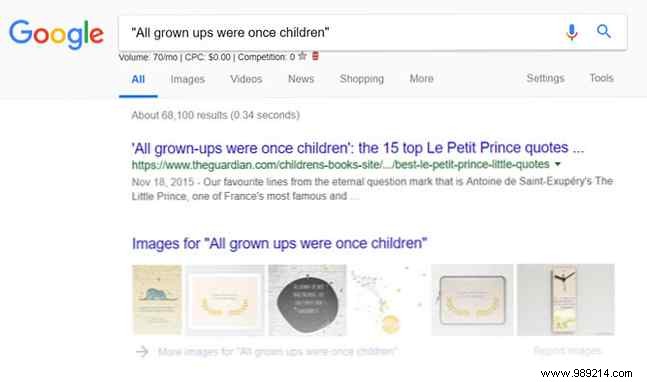
In case of a forgotten title or author, you should remember anything you can use from the book. It can be a character name, a line of dialogue, or even basic plot points. The more specific the phrase, the better the result. All the rules of a normal search apply (for example, for exact searches, enclose them in quotation marks). Google's auto-suggestions will also let you know if you're on the right track.
Tipping: Searching for a long-lost book is a great way to master advanced Google Search skills 11 Advanced Searches to Bookmark as a Google Power User 11 Advanced Searches to Bookmark as a Google Power User. 11 advanced searches and pro tips. This will ensure that you never have to remember these searches, and yet always have them at your fingertips. Read more . For example, you can include or exclude specific keywords, search using an exact phrase, or use the wildcard operator to guess a character's name.
As an avid reader, you should have heard of the huge Google Books library project. Search any book with Google. It's finally legal! Search any book with Google - It's finally legal! The Google Books Library Project allows you to find books by searching through their texts and content! Read more . It is the largest book cataloging project of its kind. Google Book Search works just like Google Search.
The difference is that the reference page displayed for your search result also contains additional information, such as various covers, tables of contents, common terms and phrases, and popular passages from the book. You can view sample pages and check if this is the book you were looking for. Also, you can search within a book.
Use Google's advanced search page with filters such as subject, publisher, language, publication date, ISBN and ISSN numbers (it won't remember these two).
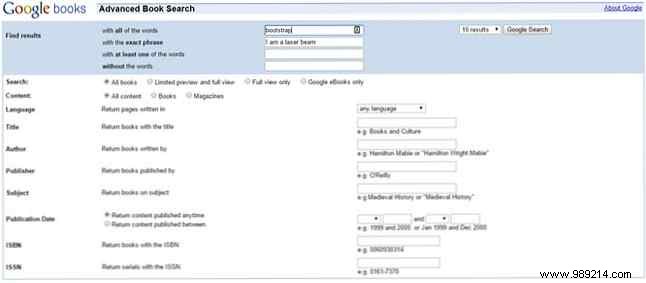
Experiment with keywords and wildcard operators to get a clue. Even if you don't find the book you're looking for, you may be able to find a reference that will then lead you to the answer.
There are some more specialized search engines for book searches.
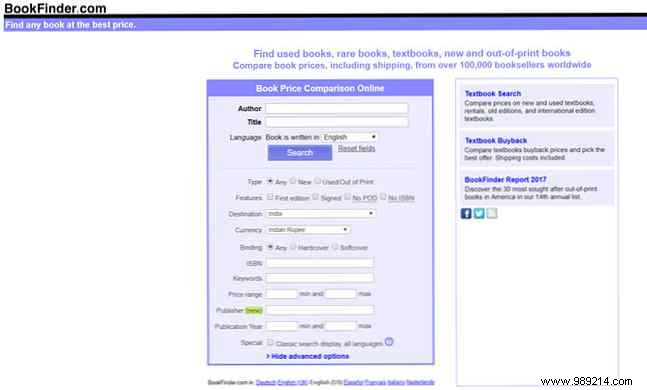
BookFinder is an advanced search engine (click Show more options ) that taps into the inventories of more than 100,000 booksellers worldwide. Try a keyword search, or if you can get it back, narrow your query by year of publication.
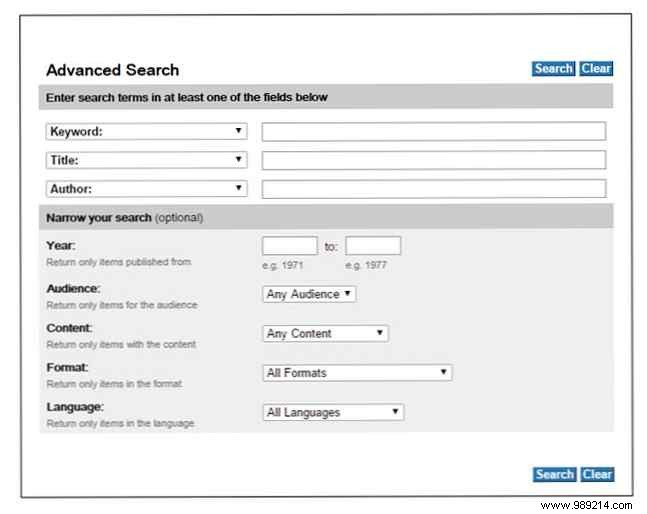
WorldCat is the world's largest network of library content and services. You can search the worldwide database of 72,000 libraries in 170 countries. Find a book and then locate it at a nearby library. Library membership allows you to review the article online. Try the Advanced Search With unique filters such as audience and languages..
Check out WorldCat Genres (or Fictional Finder) to help you explore fiction genres for hundreds of titles, authors, subjects, characters, locations, and more, ranked by popularity in the world's libraries.

The Library of Congress (LOC) is the largest library in the world and today also houses a large digital collection. An online book search through its catalog of 167 million items that includes books, serials, manuscripts, maps, music, recordings, images, and electronic resources shouldn't take long. And to top it off, the LOC has a friendly Ask A Librarian form for inquiries.
Also, check out the National Library Service for the Blind and Physically Handicapped (NLS) search tool, which is another Library of Congress utility.
Amazon started life as an online bookstore. It remains the leading category by sales with millions of titles in stock at any one time. If Amazon doesn't sell the book you're looking for, then it's probably no longer available (or just a figment of your imagination). The basic search bar can get you closer to the book with a keyword. However, Amazon Advanced Book Search can do the real work.
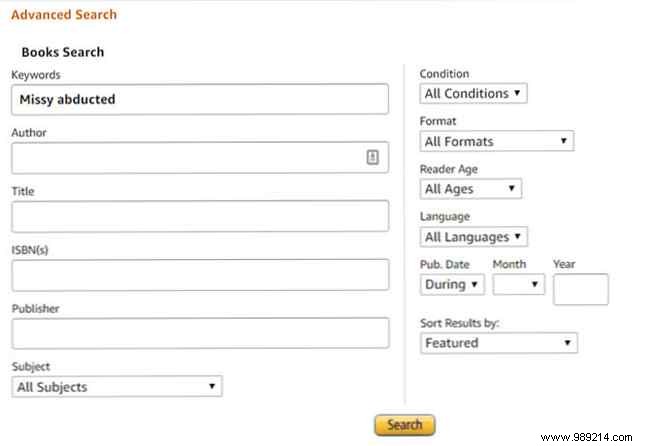
Amazon does not have an official list of advanced search operators. But it does show some search tips on the previous page. The API documentation also lists some power searches you can try for your book. Go through the documentation by clicking "Next." For example, experimenting with the [title-starts] keyword might return close results.
The trick is to cut through the clutter of Amazon search results. Try this nifty Amazon advanced search tool called JungleSearch.net where it can help you get hidden Amazon search results as well.
And if all else fails, then do a Google search of the site. You may be lucky. For example:
Amazon not only matches your keywords to titles and authors, but also to every word within a book. You can find out if this is the exact book you're looking for by clicking the Look Inside button. Link and going through the preview pages. Use the Search in this book field to search for sentences, key phrases, and even quotes.
Any website that will help you discover your next book. The Last 50 Ways to Find New Books to Read The Last 50 Ways to Find New Books to Read There are some books we just don't want to put down. Thanks to the many tools available today, your next reading adventure can start instantly. Find what you need to read next with this guide. Read More Tap into the collective memory of book lovers on these recommended book platforms.
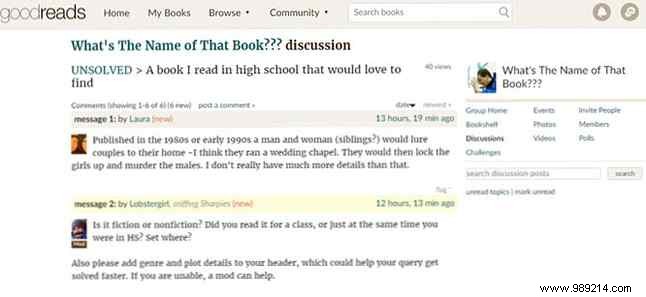
Goodreads is a subsidiary of Amazon. As such, you can expect the knowledge base to be just as vast. This social network for book nerds has discussion forums on a variety of topics.
You can go to any gender specific group and ask for help. But it might be worth trying these first two:
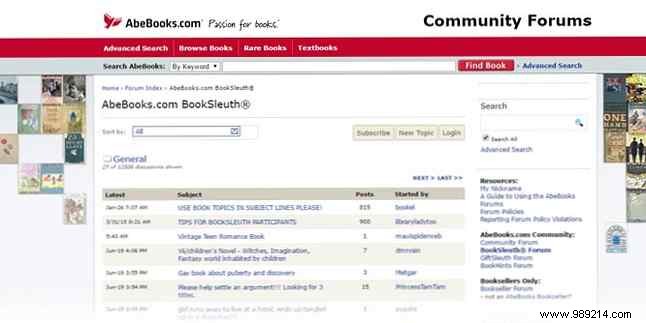
The appropriate name BookSleuth It's another good hunting ground for forgotten titles. Please use the community forum which is organized by genre and provide as much detail as you can for members to help you.
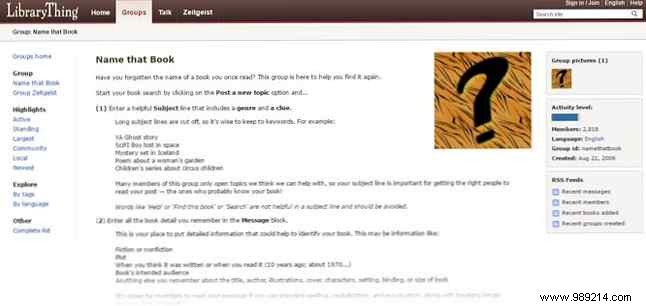
LibraryThing is a less modern and more cerebral alternative to Goodreads. Start a new topic for your specific search in this community group and enter as many book details as you can remember.
By now, you should have recovered the book or your memory. If not, your search has probably hit a frustrating roadblock because the book-loving masses haven't been able to rescue you yet. It's time to extend your reach with an SOS on the social network of your choice.
The social network is not just for finding long-lost friends. You can also call on the wisdom of the crowd to help you find that elusive book. Your own social circle might be too limited, so broaden your search by using book clubs.
Mark Zuckerberg started A Year of Books, and now he has close to 800,000 followers. Even smaller public groups, like books, are worth a try. You just have to shout above the noise..
Start with a Twitter search. Hashtags are what make microblogging work, but a generic #books or #bibliophile hashtag can be too broad. Try plugging in the specific genre in a hashtag search (eg #DarkFantasy or #UrbanFantasy) to narrow down your results and/or when asking for help.
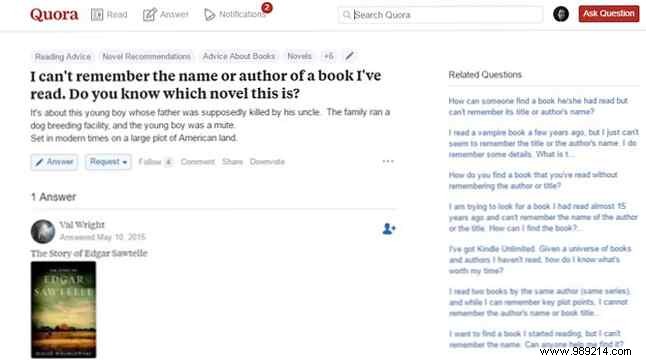
The question-and-answer site could be the largest gathering of “experts” outside of Facebook and Twitter. The great thing about Quora is that you can expect a quality response. Take the answer in the screenshot for example.
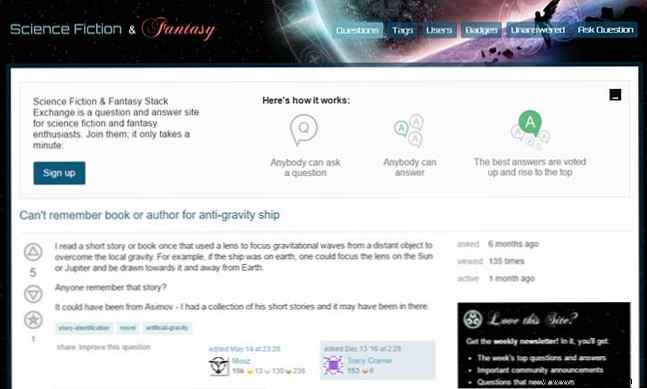
A potpourri of 168 question and answer communities makes up Stack Exchange. Stack Overflow may be the most popular among programmers, but there are niche communities for e-books and literature. Then you can also enter a gender-specific community and leave a question. Science fiction and fantasy is popular..
You couldn't have thought of a better name for a subreddit on books than Tip of My Tongue. Simply scan your eyes for the green-tagged resolved answers to understand the power of collective memory. Also, try other subreddits like What's That That Book, Books, and printSF when you can only remember the cover.
The web is built on the kindness of strangers. The good thing is that book lovers are everywhere and the fraternity is incredibly cooperative. We can always find them together in a group or community..
So the next time you have a memory block, try to recall some vague detail from the book.
Go back in time to recall any physical features or illustrations. Try to bring up some associated memories:what were you doing when you were reading that book? How old were you? Was it a gift or did you borrow it?
Trust me, every little bit of information helps. But the best advice I can offer to all book lovers is this:make a reading list and keep it organized How to Organize Your Out of Control Reading List Right Now How to Organize Your Out of Control Reading List Right Now A read list serves many functions, from practical to inspiring. But it can also get out of hand. Using these tips to manage your reading hobby can do wonders for your life. Read more !